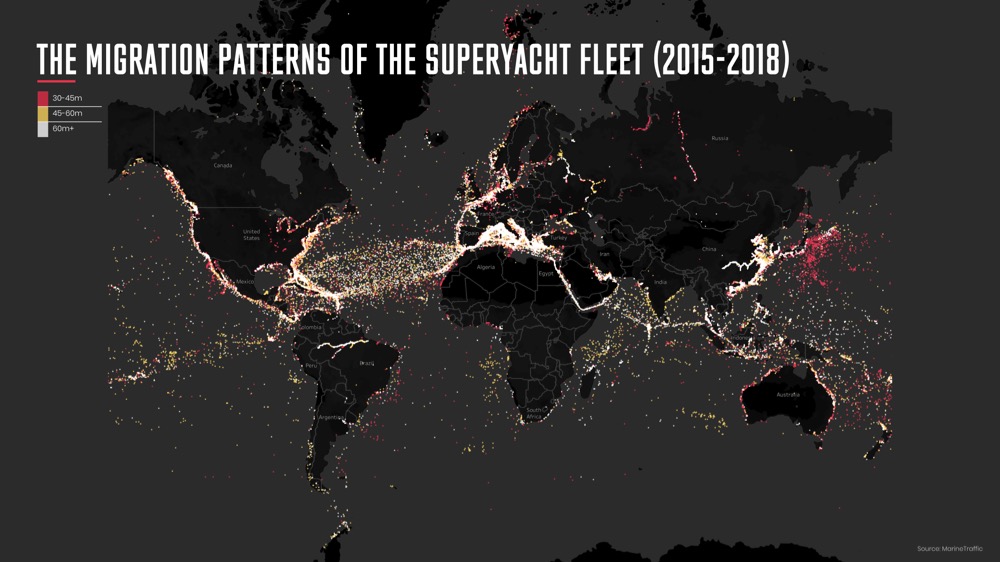The data mindset hindering progress
Convincing custodians to share accurate data was a hot topic at The Superyacht Forum…
Our pursuit for a market data-cum-intelligence utopia is still beyond our grasp – that was at least the key observation from The Business of Data seminar on day one of The Superyacht Forum.
How in 2019/2020, does an industry like ours still find itself in a position where there is so little co-operation to share credible market data? Speaking as an external market force Tommaso Nastasi partner for Deloitte Italy surmises - “we’re about the same as where we were 17-years ago”. So, where does the problem lie? It appears the answer is rooted in an outdated, insular approach to data-sharing, with many stakeholders citing privacy and confidentiality as their main reason for withholding even the broader market metrics.
Our failure to share is having a profoundly negative effect on the market. To other industries and potential investors there is various misconceptions that suggest the superyacht market isn’t robust, lacks opportunity for financial return, is devoid of predictable market growth and that there isn’t strong market visibility.
It’s fundamental to why – from my experience and conversations with delegates – external investors are deterred from getting involved in our industry. They consider the lack of data to be proof of how fraught, uncertain and risky the superyacht market is.
Outlining the difficulty and subsequent issues a weak market data proposition has had, speaker Joseph Adir of WinterHaven Holdings commented, “I joined the industry five-years ago in an exercise to raise funds for a superyacht shipyard. Between the private equity funds and the hedge funds of London, the door was consistently slammed in my face again and again and again. All of these investors refused to treat the superyacht industry as a viable, bankable proposition because they were unable to find any benchmarks, any research, any bankable data”.
To ensure the market evolves, it requires legitimate investment. Credible data shared by all key market players is crucial to attracting external investment and, therefore, the growth of the market.
Adir continues, “...you cannot grow a shipyard if you don’t have working capital; you cannot grow or evolve all the infrastructure if you don’t have debt. In every industry debt is 60 to 80 per cent of the power. If the data is being withheld, it cannot be used to support a credible market audit, we become ineligible for debt, we cannot grow”.
The key element of the conversation thrust into the spotlight issues relating to the confidentiality and privacy of the data; “The challenge is not only to collect the data, but to change the mindset,” comments Nastasi.
From my experience this has always dogged market research, audits and statistical models – less the prevalence of the data.
In fact, as I author this article I’ve been told by one of my team that a Dutch shipyard has point-blank refused to confirm the number of yachts they have in build and what their provisional delivery dates may be; worse still a dominant Italian shipyard is avoiding confirming which yachts will be delivered this year and which will roll-over into 2020. This is a small example of a far larger issue.
Part of it, in my opinion, is the idea that market-players can avoid reporting on the bad and only reveal that which they deem good. This perspective is naïve in the extreme given that owners and their teams will soon discover the truth of a shipyards ability once the project is underway. Furthermore, once they have seen beyond the veil the shipyard will have lost a life-long customer and brand ambassador. Being perceived to be a healthy and successful business means nothing once clients discover the truth. This mindset, however, has been historically rooted in the notion that the data is private and confidential, unless of course it is positive.
The notion of privacy, however, is not to be entirely balked at. Throughout the superyacht industry, businesses are hampered by NDAs and various agreements relating to privacy. Frequently, however, NDAs are tossed around as an excuse, rather than being a legitimate reason to withhold information. No one, for example, is asking shipyards for the names, ages, birth dates, contact numbers and account details of their clients.
“This argument is not valid. We’re not asking for disclosure regarding the principal owner, we’re asking for net-data... Is this yacht truly under construction? Has this yacht truly been delivered?”, says Adir.
Moreover, we may ask for information about ownership, but never an owner. We might, for example, ask for information relating to the nationality of owners across various size ranges. It will come as absolutely no surprise to us when we discover that US owners dominate the market, yet it might just provide an extra layer of detail and credibility to help the market evolve.
For one delegate representing a prominent Dutch new build shipyard, the idea of sharing even relatively broad market data was incomprehensible. “The number of yachts is so finite that when I see the order book of another yard for 50 per cent of that order I know who bought it, it’s out in the open; we get to a privacy level that’s a real problem. Then we’re talking about data, data, data, but nobody is talking about why they need the data... for what do you need it... and who will provide that data? Because there seems to be a disconnect”.
“But in the world today, in today’s regularity world, can anyone keep hiding?” rebuts Adir, with a sentiment shared by another delegate; “The industry isn’t asking for private details, that’s the thing we’ve got to get away from, that’s the critical defining factor. We are not asking for private information from anyone. The data is easy to find. It’s there. Most yachts aren’t even in these individuals’ names. There’s no point hiding behind the veil because it’s already there, the data can’t get passed the veil. Using the excuse ‘you can’t have the data because of the personal information’ doesn’t fly in today’s market”.
Adir adds, “I do not think you understand the clients of the next generation. Americans now make up about half of the buyers and they’re getting younger and younger - these are the billionaires form Silicon Valley and LA. Looking at the latest report from UBS and PWC which audits the UHNW demographic, these people will not accept the norms of our industry. They are not willing to listen to these stories anymore. They’re coming from a completely different world. They want full transparency across the board”.
Of course, attracting external investment isn’t the sole beneficiary of sharing market data, it’s critical to growing and evolving the market across the spectrum, even for the players where there are high barriers to entry. Each business needs to know whether the market is moving, if growth is stagnating in one segment and growing in another and ultimately whether to invest in infrastructure or not... and how much? This is data that everyone from SME’s to the blue-ribbon enterprises of the superyacht market rely on to inform their business strategies. But it’s even more than that, as Udo put’s it – “It’s crucial to educating legislators on market size, turnover, employment and lobbying for regulation that supports the sector as well”.
NEW: Sign up for SuperyachtNewsweek!
Get the latest weekly news, in-depth reports, intelligence, and strategic insights, delivered directly from The Superyacht Group's editors and market analysts.
Stay at the forefront of the superyacht industry with SuperyachtNewsweek
Click here to become part of The Superyacht Group community, and join us in our mission to make this industry accessible to all, and prosperous for the long-term. We are offering access to the superyacht industry’s most comprehensive and longstanding archive of business-critical information, as well as a comprehensive, real-time superyacht fleet database, for just £10 per month, because we are One Industry with One Mission. Sign up here.
Related news

Optimising on-board systems with artificial intelligence
A panel at TSF discussed how AI and ML technologies will transform the way that superyachts are operated
Technology

Nobility of purpose
The drive to counteract the nefarious perception of the superyacht industry is a unanimous goal
Business

Where other databases finish, our intelligence starts
Introducing the strongest market analysis subscription proposition available
Fleet

Market perception
How a quality Mediterranean marina was able to educate the market on its offering
Business
NEW: Sign up for
SuperyachtNewsweek!
Get the latest weekly news, in-depth reports, intelligence, and strategic insights, delivered directly from The Superyacht Group's editors and market analysts.
Stay at the forefront of the superyacht industry with SuperyachtNewsweek




